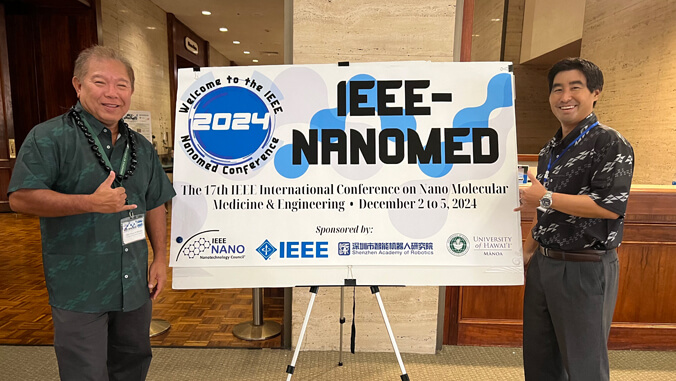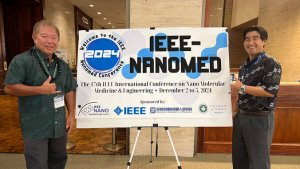


Honolulu became the epicenter of innovation in nano and molecular medicine in December, as the 17th IEEE-NANOMED conference (Institute of Electrical and Electronics Engineers International Conference on Nano/Molecular Medicine and Engineering) welcomed top scientists, engineers and clinicians from around the world.
The conference, hosted by the University of Hawaiʻi and sponsored by the IEEE Nanotechnology Council, featured groundbreaking research in areas such as cancer immunotherapy, biomedical sensors and single-cell manipulation—work poised to transform modern medicine.

The event featured keynote talks from leaders in the field, such as UH Mānoa Department of Electrical and Computer Engineering Professor Olga Boricć-Lubecke, with her research on physiological radar for biomedical monitoring. Other sessions discussed the latest developments in micro/nano-enabled sensors for smart healthcare, reflecting the conference’s focus on cutting-edge translational research.
Ten UH College of Engineering faculty members presented their findings, a significant achievement for the institution. UH Professor Wayne Shiroma noted, “That ten UH engineering faculty are presenting papers at this premier conference demonstrates how UH is at the forefront in this field.”

The conference also provided invaluable opportunities for more than 20 UH students. UH Professor and general chair of the conference, Aaron Ohta, emphasized the significance of their involvement.
“The benefit to them is not only learning about the topical research, but also networking with field experts in their own backyard,” Ohta said. “This exposure to global leaders in nano and molecular medicine is expected to inspire Hawaiʻi’s next generation of researchers and innovators.”
In addition to advancing research, the conference has brought tangible benefits to Hawaiʻi. More than 130 researchers and their families traveled to the islands, boosting local businesses and demonstrating the state’s ability to provide an ideal setting for researchers looking to collaborate. Ohta highlighted the broader impact of the event, saying, “This conference brings together engineers and biologists with the goal of improving biomedical research and healthcare. Everyone wants to be healthier, with increased access to high-quality medical care, and these researchers are working towards creating that reality.”